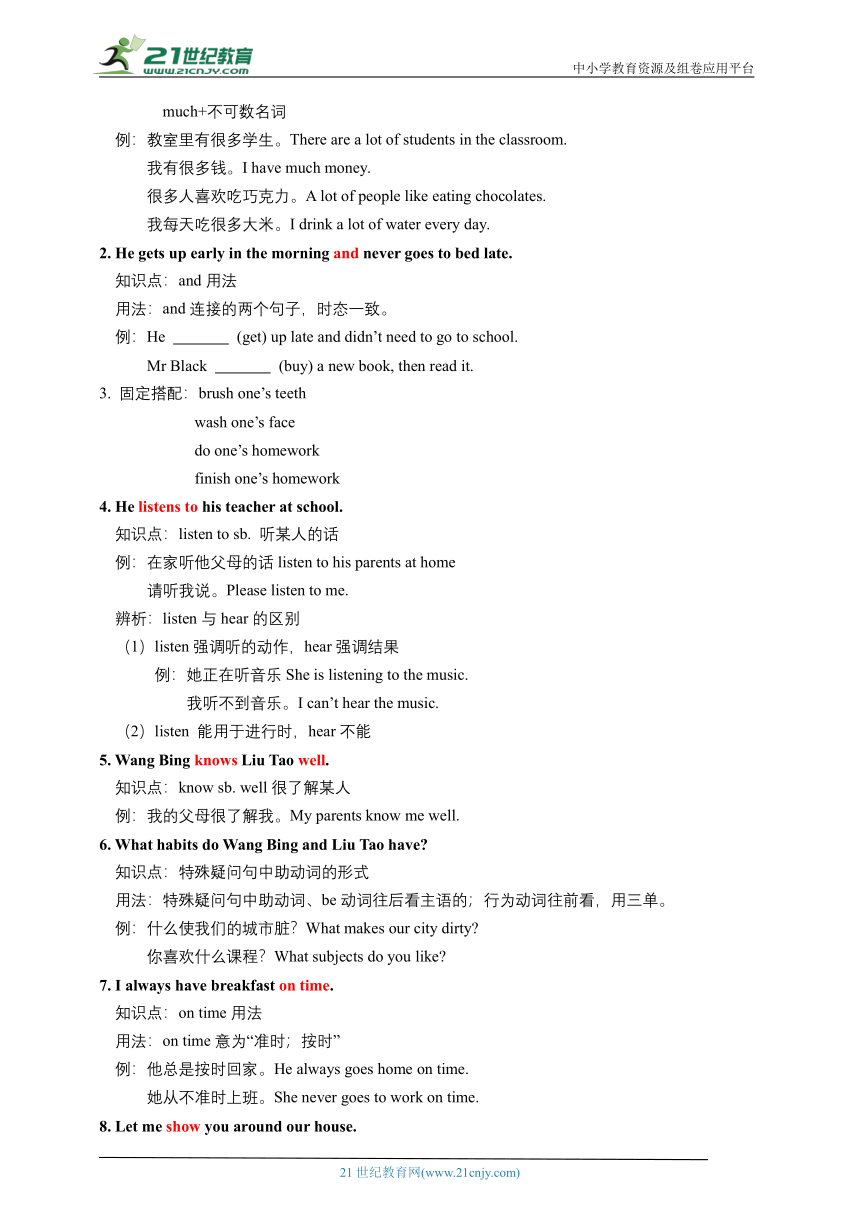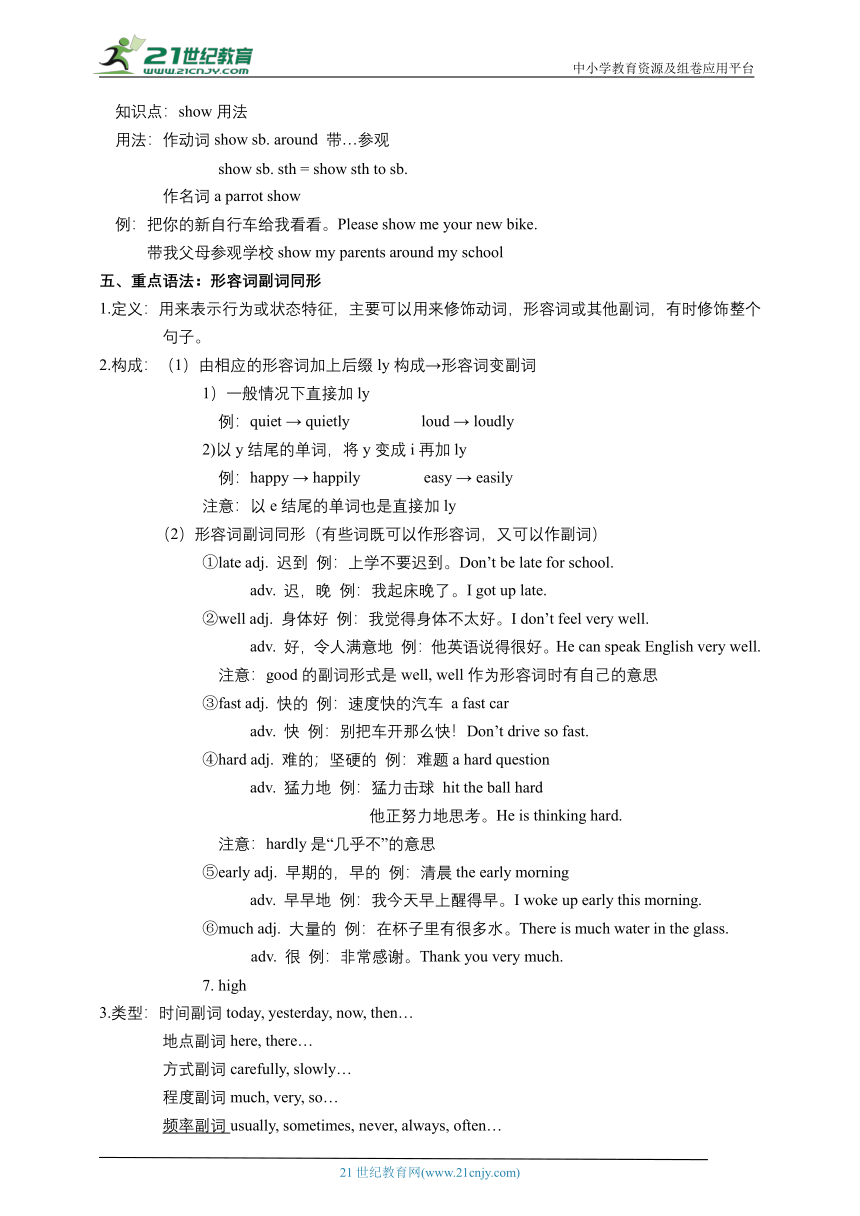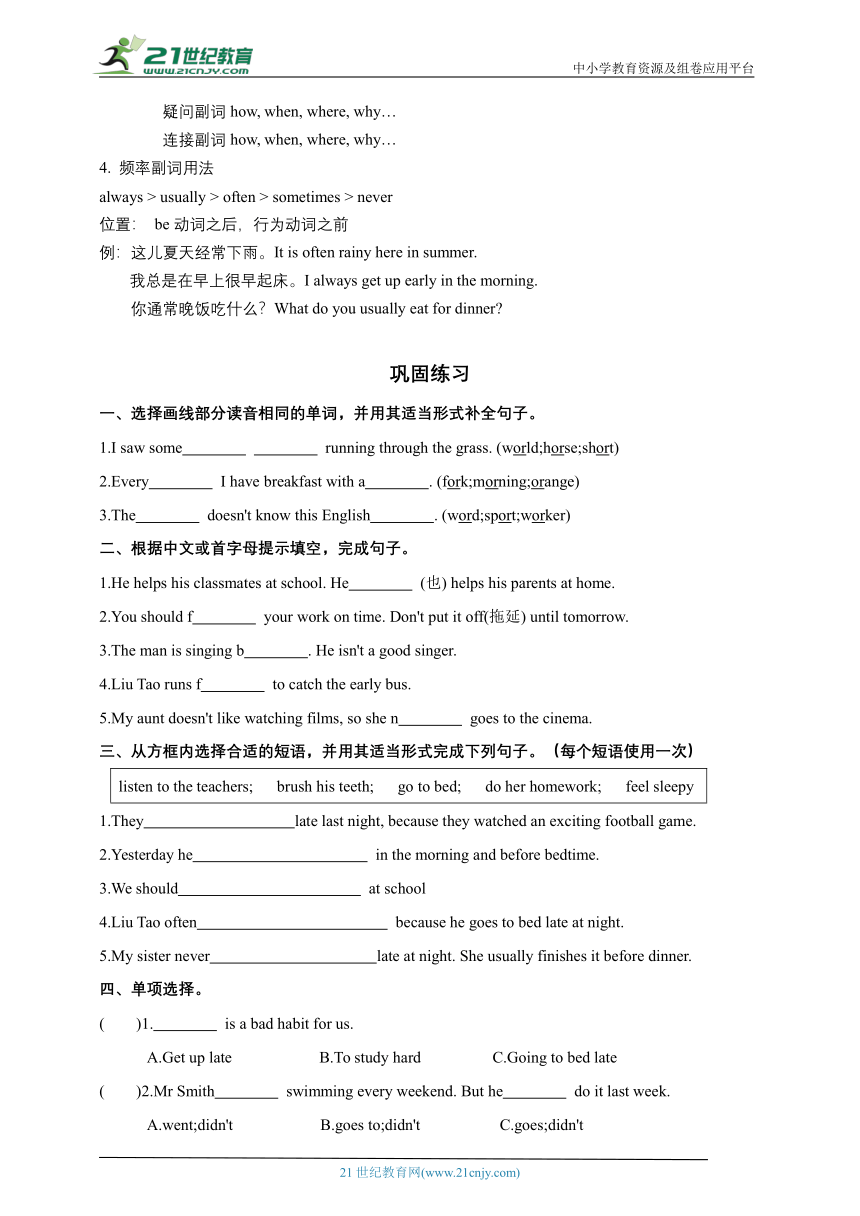【期末总复习】Unit 2 Good habits知识梳理+巩固练习(含答案)
文档属性
| 名称 | 【期末总复习】Unit 2 Good habits知识梳理+巩固练习(含答案) |  | |
| 格式 | doc | ||
| 文件大小 | 1.9MB | ||
| 资源类型 | 试卷 | ||
| 版本资源 | 牛津译林版 | ||
| 科目 | 英语 | ||
| 更新时间 | 2023-06-03 15:19:40 | ||
图片预览




文档简介
中小学教育资源及组卷应用平台
Unit 2 Good habits
知识梳理+巩固练习(含解析)
语音
解析:字母组合or在单词中一般发/ :/
发音方式:这是个长元音,发音时双唇收圆,后舌抬高,牙床半开,肌肉稍紧。
例如:morning shorts more order before
字母组合or在重读音节中,都发/ :/
拓展: 在w后发/ :/,如:work, homework, world, word
在非重读音节中发/ /, 如:doctor, actor
重点单词
四会
habit习惯 never从不 late迟,晚
finish完成 tidy干净的,整齐的 fast快地
三会
bad不好的,坏的 sleepy困的,困倦的 slowly慢速地
badly差地,不好
核心短语
good/bad habits好/坏习惯 get up early起床起得早
never go to bed late从不晚睡 brush one's teeth刷牙
before bedtime就寝前 put...in order把…整理得井井有条
finish one's homework完成家庭作业 before dinner晚餐前
listen to his teachers听他老师的话 do well at home在家做得好
keep his room clean and tidy保持他的房间干净、整洁
feel sleepy感到困倦 know...well对…很了解
last night昨夜 walk fast走得快
on time按时 pick one挑选一个
run through the grass奔跑穿过草地 wash one's face洗脸
come to see her来看她 show sb around.…带某人参观…
go into走进,走入 on the floor在地板上
run slowly跑得慢 sing badly唱得不好
重点句型
1. He has many good habits.
知识点:复习many用法
用法:many+可数名词复数
a lot of +可数名词复数/不可数名词
much+不可数名词
例:教室里有很多学生。There are a lot of students in the classroom.
我有很多钱。I have much money.
很多人喜欢吃巧克力。A lot of people like eating chocolates.
我每天吃很多大米。I drink a lot of water every day.
2. He gets up early in the morning and never goes to bed late.
知识点:and用法
用法:and连接的两个句子,时态一致。
例:He (get) up late and didn’t need to go to school.
Mr Black (buy) a new book, then read it.
3. 固定搭配:brush one’s teeth
wash one’s face
do one’s homework
finish one’s homework
4. He listens to his teacher at school.
知识点:listen to sb. 听某人的话
例:在家听他父母的话listen to his parents at home
请听我说。Please listen to me.
辨析:listen与hear的区别
(1)listen强调听的动作,hear强调结果
例:她正在听音乐She is listening to the music.
我听不到音乐。I can’t hear the music.
(2)listen 能用于进行时,hear不能
5. Wang Bing knows Liu Tao well.
知识点:know sb. well很了解某人
例:我的父母很了解我。My parents know me well.
6. What habits do Wang Bing and Liu Tao have
知识点:特殊疑问句中助动词的形式
用法:特殊疑问句中助动词、be动词往后看主语的;行为动词往前看,用三单。
例:什么使我们的城市脏?What makes our city dirty
你喜欢什么课程?What subjects do you like
7. I always have breakfast on time.
知识点:on time用法
用法:on time意为“准时;按时”
例:他总是按时回家。He always goes home on time.
她从不准时上班。She never goes to work on time.
8. Let me show you around our house.
知识点:show用法
用法:作动词show sb. around 带…参观
show sb. sth = show sth to sb.
作名词a parrot show
例:把你的新自行车给我看看。Please show me your new bike.
带我父母参观学校show my parents around my school
重点语法:形容词副词同形
1.定义:用来表示行为或状态特征,主要可以用来修饰动词,形容词或其他副词,有时修饰整个句子。
2.构成:(1)由相应的形容词加上后缀ly构成→形容词变副词
1)一般情况下直接加ly
例:quiet → quietly loud → loudly
2)以y结尾的单词,将y变成i再加ly
例:happy → happily easy → easily
注意:以e结尾的单词也是直接加ly
(2)形容词副词同形(有些词既可以作形容词,又可以作副词)
①late adj. 迟到 例:上学不要迟到。Don’t be late for school.
adv. 迟,晚 例:我起床晚了。I got up late.
②well adj. 身体好 例:我觉得身体不太好。I don’t feel very well.
adv. 好,令人满意地 例:他英语说得很好。He can speak English very well.
注意:good的副词形式是well, well作为形容词时有自己的意思
③fast adj. 快的 例:速度快的汽车 a fast car
adv. 快 例:别把车开那么快!Don’t drive so fast.
④hard adj. 难的;坚硬的 例:难题a hard question
adv. 猛力地 例:猛力击球 hit the ball hard
他正努力地思考。He is thinking hard.
注意:hardly是“几乎不”的意思
⑤early adj. 早期的,早的 例:清晨the early morning
adv. 早早地 例:我今天早上醒得早。I woke up early this morning.
⑥much adj. 大量的 例:在杯子里有很多水。There is much water in the glass.
adv. 很 例:非常感谢。Thank you very much.
7. high
3.类型:时间副词today, yesterday, now, then…
地点副词here, there…
方式副词carefully, slowly…
程度副词much, very, so…
频率副词usually, sometimes, never, always, often…
疑问副词how, when, where, why…
连接副词how, when, where, why…
4. 频率副词用法
always > usually > often > sometimes > never
位置: be动词之后,行为动词之前
例:这儿夏天经常下雨。It is often rainy here in summer.
我总是在早上很早起床。I always get up early in the morning.
你通常晚饭吃什么?What do you usually eat for dinner
巩固练习
选择画线部分读音相同的单词,并用其适当形式补全句子。
1.I saw some running through the grass. (world;horse;short)
2.Every I have breakfast with a . (fork;morning;orange)
3.The doesn't know this English . (word;sport;worker)
根据中文或首字母提示填空,完成句子。
1.He helps his classmates at school. He (也) helps his parents at home.
2.You should f your work on time. Don't put it off(拖延) until tomorrow.
3.The man is singing b . He isn't a good singer.
4.Liu Tao runs f to catch the early bus.
5.My aunt doesn't like watching films, so she n goes to the cinema.
从方框内选择合适的短语,并用其适当形式完成下列句子。(每个短语使用一次)
listen to the teachers; brush his teeth; go to bed; do her homework; feel sleepy
1.They late last night, because they watched an exciting football game.
2.Yesterday he in the morning and before bedtime.
3.We should at school
4.Liu Tao often because he goes to bed late at night.
5.My sister never late at night. She usually finishes it before dinner.
单项选择。
( )1. is a bad habit for us.
A.Get up late B.To study hard C.Going to bed late
( )2.Mr Smith swimming every weekend. But he do it last week.
A.went;didn't B.goes to;didn't C.goes;didn't
( )3.-- jacket is that on the playground
--Maybe it's Linda's. She a PE lesson just now.
A.Who's;had B.Whose;had C.Who;has
( )4.--I know Wang Bing very .
--Me too. I know a lot him.
A.good;about B.well;of C.well;about
按要求完成句子。
1.Did Bob put his pencil case in the schoolbag last night (改为陈述句)
his pencil case in the schoolbag last night.
2.She always comes to school early.(改为同义句)
She to school .
3.He feels tired in the morning.(对画线部分提问)
he in the morning
4.He does well at home.(改为否定句)
He well at home.
根据中文提示完成句子或对话。
1.王兵总是把他的物品整理得井井有条。
Wang Bing his things .
2.她保持她的卧室干净整洁。
She her bedroom and .
3.--你有什么坏习惯吗? --我的课桌总是脏乱的。
--What do you have
--I make my desk .
单项选择。
( )1.-- is your bike
--The yellow one under the tree.
A.Which B.What colour C.Where D.How
( )2.-- Mike run fast
--Yes.And he also jumps
A.Is;high B.Do;slowly C.Does;highly D.Does;high
( )3.My father and my mother work on Sundays.
A.don't B.doesn't C.isn't D.aren't
( )4.--What are you doing
--We're goodbye our teachers.
A.say;with B.say;to C.saying;to D.saying;with
( )5.To keep my sister studying , I often help .
A.good;her B.well;her C.hard;him D.hardly;him
根据上下文或首字母提示填空,补全对话。
Tina: Hello!Let me s you a my house.
Friends: Oh! The living room is so big and nice.
Tina: Thank you!
Friends: Whose bedroom is this
Tina: It's my .
Friends: There are of books and toys the floor.
Tina: Bobby, where are you
Bobby: I'm the bed.
Tina: Look! What a mess!
Bobby: I'm sorry. I played too e with Sam last night.
Tina: Come out q ! You should put your books and toys in.
Bobby: OK. Don't be a , my dear sister. I'll clean my room at once(立刻).
根据上下文和首字母填空,补全短文。
Good h make a good life. We should go to bed e every day, so we will not feel sleepy the n morning. In class, we should 1 to the teachers. As a good student, we should finish our h first after s . We should also put our things in o because a clean and t room makes us happy.
参考答案及解析
1.short horses解析:short/ :/ horse/ :/
2.morning;fork 解析:morning/ : fork/ :/
3.worker;word 解析:worker/ :/ word/ :/
1.also解析:also和too都可以表示“也”。also常用于句中,紧靠动词。too放在句末。
2.finish 3.badly 4.fast 5.never
1.went to bed 2.brushed his teeth 3.listen to the teachers
4.feels sleepy 5.does her homework
1.C解析:句意:……对我们来说是坏习惯。A.起床晚;B.努力学习;C.晚睡觉。此处缺主语,根
据句意及常识可知选C。
2.C解析:根据题中的every weekend可知,第一空应该选择一般现在时,又根据后文的last week可知,第二空应该用过去式;固定搭配:go swimming去游泳,故选C。
3.B解析:who谁;who's是谁;whose谁的。根据句意“那是谁的夹克衫在操场上 ”可知,第一空应用形容词修饰其后名词,所以应用whose提问,第二空根据just now可知,用had。故选B。
4.C解析:句意:我很了解王兵。我也是。我知道很多关于他的事。know是实义动词,需要用副词来修饰,故选well,关于某人用介词about,故选C。
1.Bob put解析:put的过去式是不规则变化,和原形同形。
2.never comes; late 3.How does;feel 4.does not do
1.always puts;in order 2.keeps;clean; tidy 3.bad habits;often;messy
1.A解析:根据答语句意“树底下那辆黄色的。”可知,问句是在问“哪一辆是你的自行车 ”,故选疑
问词Which。What colour什么颜色;Where在哪里;How怎样,故选A。
2.D解析:根据问句中有实义动词可知,第一空应选择助动词,又因为Mike是第三人称单数,故用Does;第二空jump为实义动词,需要用副词修饰,high可作为副词,而highly表示程度的高,故选D.
3.A解析:主语是两个人,且句子中有实义动词work,应该用助动词do。故选A。
4.C解析:根据问句可知时态为现在进行时,结构为be动词十动词-ing,所以第一空应用saying;固定用法:say goodbye to sb向某人说再见,故选C。
5.B解析:第一空修饰动词study,表示一种状态,后用副词well;第二空根据my sister可知是her,故选B。
show; around; brother's; lots; on; under; excitedly; quickly; order;angry
habits;early; next;listen; homework;school; order;tidy
HYPERLINK "http://21世纪教育网(www.21cnjy.com)
" 21世纪教育网(www.21cnjy.com)
Unit 2 Good habits
知识梳理+巩固练习(含解析)
语音
解析:字母组合or在单词中一般发/ :/
发音方式:这是个长元音,发音时双唇收圆,后舌抬高,牙床半开,肌肉稍紧。
例如:morning shorts more order before
字母组合or在重读音节中,都发/ :/
拓展: 在w后发/ :/,如:work, homework, world, word
在非重读音节中发/ /, 如:doctor, actor
重点单词
四会
habit习惯 never从不 late迟,晚
finish完成 tidy干净的,整齐的 fast快地
三会
bad不好的,坏的 sleepy困的,困倦的 slowly慢速地
badly差地,不好
核心短语
good/bad habits好/坏习惯 get up early起床起得早
never go to bed late从不晚睡 brush one's teeth刷牙
before bedtime就寝前 put...in order把…整理得井井有条
finish one's homework完成家庭作业 before dinner晚餐前
listen to his teachers听他老师的话 do well at home在家做得好
keep his room clean and tidy保持他的房间干净、整洁
feel sleepy感到困倦 know...well对…很了解
last night昨夜 walk fast走得快
on time按时 pick one挑选一个
run through the grass奔跑穿过草地 wash one's face洗脸
come to see her来看她 show sb around.…带某人参观…
go into走进,走入 on the floor在地板上
run slowly跑得慢 sing badly唱得不好
重点句型
1. He has many good habits.
知识点:复习many用法
用法:many+可数名词复数
a lot of +可数名词复数/不可数名词
much+不可数名词
例:教室里有很多学生。There are a lot of students in the classroom.
我有很多钱。I have much money.
很多人喜欢吃巧克力。A lot of people like eating chocolates.
我每天吃很多大米。I drink a lot of water every day.
2. He gets up early in the morning and never goes to bed late.
知识点:and用法
用法:and连接的两个句子,时态一致。
例:He (get) up late and didn’t need to go to school.
Mr Black (buy) a new book, then read it.
3. 固定搭配:brush one’s teeth
wash one’s face
do one’s homework
finish one’s homework
4. He listens to his teacher at school.
知识点:listen to sb. 听某人的话
例:在家听他父母的话listen to his parents at home
请听我说。Please listen to me.
辨析:listen与hear的区别
(1)listen强调听的动作,hear强调结果
例:她正在听音乐She is listening to the music.
我听不到音乐。I can’t hear the music.
(2)listen 能用于进行时,hear不能
5. Wang Bing knows Liu Tao well.
知识点:know sb. well很了解某人
例:我的父母很了解我。My parents know me well.
6. What habits do Wang Bing and Liu Tao have
知识点:特殊疑问句中助动词的形式
用法:特殊疑问句中助动词、be动词往后看主语的;行为动词往前看,用三单。
例:什么使我们的城市脏?What makes our city dirty
你喜欢什么课程?What subjects do you like
7. I always have breakfast on time.
知识点:on time用法
用法:on time意为“准时;按时”
例:他总是按时回家。He always goes home on time.
她从不准时上班。She never goes to work on time.
8. Let me show you around our house.
知识点:show用法
用法:作动词show sb. around 带…参观
show sb. sth = show sth to sb.
作名词a parrot show
例:把你的新自行车给我看看。Please show me your new bike.
带我父母参观学校show my parents around my school
重点语法:形容词副词同形
1.定义:用来表示行为或状态特征,主要可以用来修饰动词,形容词或其他副词,有时修饰整个句子。
2.构成:(1)由相应的形容词加上后缀ly构成→形容词变副词
1)一般情况下直接加ly
例:quiet → quietly loud → loudly
2)以y结尾的单词,将y变成i再加ly
例:happy → happily easy → easily
注意:以e结尾的单词也是直接加ly
(2)形容词副词同形(有些词既可以作形容词,又可以作副词)
①late adj. 迟到 例:上学不要迟到。Don’t be late for school.
adv. 迟,晚 例:我起床晚了。I got up late.
②well adj. 身体好 例:我觉得身体不太好。I don’t feel very well.
adv. 好,令人满意地 例:他英语说得很好。He can speak English very well.
注意:good的副词形式是well, well作为形容词时有自己的意思
③fast adj. 快的 例:速度快的汽车 a fast car
adv. 快 例:别把车开那么快!Don’t drive so fast.
④hard adj. 难的;坚硬的 例:难题a hard question
adv. 猛力地 例:猛力击球 hit the ball hard
他正努力地思考。He is thinking hard.
注意:hardly是“几乎不”的意思
⑤early adj. 早期的,早的 例:清晨the early morning
adv. 早早地 例:我今天早上醒得早。I woke up early this morning.
⑥much adj. 大量的 例:在杯子里有很多水。There is much water in the glass.
adv. 很 例:非常感谢。Thank you very much.
7. high
3.类型:时间副词today, yesterday, now, then…
地点副词here, there…
方式副词carefully, slowly…
程度副词much, very, so…
频率副词usually, sometimes, never, always, often…
疑问副词how, when, where, why…
连接副词how, when, where, why…
4. 频率副词用法
always > usually > often > sometimes > never
位置: be动词之后,行为动词之前
例:这儿夏天经常下雨。It is often rainy here in summer.
我总是在早上很早起床。I always get up early in the morning.
你通常晚饭吃什么?What do you usually eat for dinner
巩固练习
选择画线部分读音相同的单词,并用其适当形式补全句子。
1.I saw some running through the grass. (world;horse;short)
2.Every I have breakfast with a . (fork;morning;orange)
3.The doesn't know this English . (word;sport;worker)
根据中文或首字母提示填空,完成句子。
1.He helps his classmates at school. He (也) helps his parents at home.
2.You should f your work on time. Don't put it off(拖延) until tomorrow.
3.The man is singing b . He isn't a good singer.
4.Liu Tao runs f to catch the early bus.
5.My aunt doesn't like watching films, so she n goes to the cinema.
从方框内选择合适的短语,并用其适当形式完成下列句子。(每个短语使用一次)
listen to the teachers; brush his teeth; go to bed; do her homework; feel sleepy
1.They late last night, because they watched an exciting football game.
2.Yesterday he in the morning and before bedtime.
3.We should at school
4.Liu Tao often because he goes to bed late at night.
5.My sister never late at night. She usually finishes it before dinner.
单项选择。
( )1. is a bad habit for us.
A.Get up late B.To study hard C.Going to bed late
( )2.Mr Smith swimming every weekend. But he do it last week.
A.went;didn't B.goes to;didn't C.goes;didn't
( )3.-- jacket is that on the playground
--Maybe it's Linda's. She a PE lesson just now.
A.Who's;had B.Whose;had C.Who;has
( )4.--I know Wang Bing very .
--Me too. I know a lot him.
A.good;about B.well;of C.well;about
按要求完成句子。
1.Did Bob put his pencil case in the schoolbag last night (改为陈述句)
his pencil case in the schoolbag last night.
2.She always comes to school early.(改为同义句)
She to school .
3.He feels tired in the morning.(对画线部分提问)
he in the morning
4.He does well at home.(改为否定句)
He well at home.
根据中文提示完成句子或对话。
1.王兵总是把他的物品整理得井井有条。
Wang Bing his things .
2.她保持她的卧室干净整洁。
She her bedroom and .
3.--你有什么坏习惯吗? --我的课桌总是脏乱的。
--What do you have
--I make my desk .
单项选择。
( )1.-- is your bike
--The yellow one under the tree.
A.Which B.What colour C.Where D.How
( )2.-- Mike run fast
--Yes.And he also jumps
A.Is;high B.Do;slowly C.Does;highly D.Does;high
( )3.My father and my mother work on Sundays.
A.don't B.doesn't C.isn't D.aren't
( )4.--What are you doing
--We're goodbye our teachers.
A.say;with B.say;to C.saying;to D.saying;with
( )5.To keep my sister studying , I often help .
A.good;her B.well;her C.hard;him D.hardly;him
根据上下文或首字母提示填空,补全对话。
Tina: Hello!Let me s you a my house.
Friends: Oh! The living room is so big and nice.
Tina: Thank you!
Friends: Whose bedroom is this
Tina: It's my .
Friends: There are of books and toys the floor.
Tina: Bobby, where are you
Bobby: I'm the bed.
Tina: Look! What a mess!
Bobby: I'm sorry. I played too e with Sam last night.
Tina: Come out q ! You should put your books and toys in.
Bobby: OK. Don't be a , my dear sister. I'll clean my room at once(立刻).
根据上下文和首字母填空,补全短文。
Good h make a good life. We should go to bed e every day, so we will not feel sleepy the n morning. In class, we should 1 to the teachers. As a good student, we should finish our h first after s . We should also put our things in o because a clean and t room makes us happy.
参考答案及解析
1.short horses解析:short/ :/ horse/ :/
2.morning;fork 解析:morning/ : fork/ :/
3.worker;word 解析:worker/ :/ word/ :/
1.also解析:also和too都可以表示“也”。also常用于句中,紧靠动词。too放在句末。
2.finish 3.badly 4.fast 5.never
1.went to bed 2.brushed his teeth 3.listen to the teachers
4.feels sleepy 5.does her homework
1.C解析:句意:……对我们来说是坏习惯。A.起床晚;B.努力学习;C.晚睡觉。此处缺主语,根
据句意及常识可知选C。
2.C解析:根据题中的every weekend可知,第一空应该选择一般现在时,又根据后文的last week可知,第二空应该用过去式;固定搭配:go swimming去游泳,故选C。
3.B解析:who谁;who's是谁;whose谁的。根据句意“那是谁的夹克衫在操场上 ”可知,第一空应用形容词修饰其后名词,所以应用whose提问,第二空根据just now可知,用had。故选B。
4.C解析:句意:我很了解王兵。我也是。我知道很多关于他的事。know是实义动词,需要用副词来修饰,故选well,关于某人用介词about,故选C。
1.Bob put解析:put的过去式是不规则变化,和原形同形。
2.never comes; late 3.How does;feel 4.does not do
1.always puts;in order 2.keeps;clean; tidy 3.bad habits;often;messy
1.A解析:根据答语句意“树底下那辆黄色的。”可知,问句是在问“哪一辆是你的自行车 ”,故选疑
问词Which。What colour什么颜色;Where在哪里;How怎样,故选A。
2.D解析:根据问句中有实义动词可知,第一空应选择助动词,又因为Mike是第三人称单数,故用Does;第二空jump为实义动词,需要用副词修饰,high可作为副词,而highly表示程度的高,故选D.
3.A解析:主语是两个人,且句子中有实义动词work,应该用助动词do。故选A。
4.C解析:根据问句可知时态为现在进行时,结构为be动词十动词-ing,所以第一空应用saying;固定用法:say goodbye to sb向某人说再见,故选C。
5.B解析:第一空修饰动词study,表示一种状态,后用副词well;第二空根据my sister可知是her,故选B。
show; around; brother's; lots; on; under; excitedly; quickly; order;angry
habits;early; next;listen; homework;school; order;tidy
HYPERLINK "http://21世纪教育网(www.21cnjy.com)
" 21世纪教育网(www.21cnjy.com)
同课章节目录
